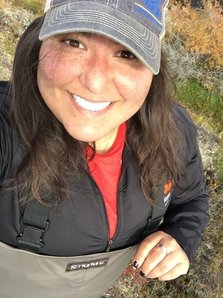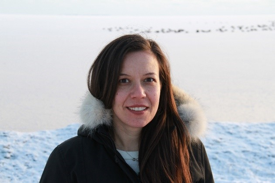 The NWT On The Land Collaborative is a collective of partners from government, industry, philanthropy, and beyond, working together to support land-based programs and projects in the NWT. Each of these partner organizations has a representative that participates in quarterly meetings and annual funding decisions. This is the fourth in a series of profiles of the people and organizations that make the Collaborative possible. You can read the other profiles here. Rebecca Plotner’s enthusiasm for the Collaborative is infectious: “I really think [the Collaborative] is wonderful…Everyone who is working on it is really great with many good ideas…And the programs being supported are awesome!” And she should know. Rebecca, who works for the Dominion Diamond Corporation, has been involved with the Collaborative since it was little more than an idea. She recalls early meetings with Kyla Kakfwi-Scott (GNWT Health and Social Services) and Steve Ellis (Tides Canada), two of the driving forces behind the Collaborative: “It started off with three or four of us hanging around a table talking about it, throwing out different ideas, and figuring out how we could get it expanded.” Even at that early stage, Rebecca saw the potential of bringing together diverse partners from government, industry, and the non-profit sector to pool their resources and support land-based programs in the territory: “We looked to examples in the south like the Northern Manitoba Food, Culture, and Community Fund. They started out with a small amount of money, but it keeps growing and they are able to help out so many people now.” Rebecca is equally impressed with how far the NWT On The Land Collaborative Fund has come in such a short period of time: “Seeing where it started to having our first workshop to where we are today in just over two years. It has been great to see the interest [in the Collaborative] and how much people have wanted to support it. The distance we covered in that time is huge!” Rebecca’s employer shares her enthusiasm for the Collaborative—they recently doubled their investment in the fund. In their words, Dominion Diamond is “pleased to be able to contribute to an initiative such as this, which emphasizes collaboration and partnership, enabling projects to come to a single place for funding. We believe the NWT On The Land Collaborative will be a key resource in the sustainability of on the land projects in the North.” Rebecca is a member of the Yellowknives Dene First Nation. Although born in Illinois, she was raised in Dettah by her parents Sarah (nee Charlo) and Mark Plotner. Her grandparents are Judy (nee Betsina) Charlo the late Joe Charlo. After studying Biochemistry at the University of Northern British Columbia in Prince George, Rebecca returned to Yellowknife. In 2010, Rebecca was hired as a Community Relations Advisor Trainee with BHP Billiton. She was attracted to the people-oriented nature of the position (“I love talking and working with people!”) and the prospect of seeing more of the territory (“I grew up in the North, but I had never been to a community that you can’t drive to.”). Six-and-a-half years later, Rebecca is a Community Development Advisor with Dominion Diamond, which acquired BHP’s interests in 2013. Dominion operates the Ekati Diamond Mine, located on Lac de Gras approximately 300 kilometres northeast of Yellowknife. Amongst other things, Rebecca helps to administer the Ekati Plus Community Development Program. Through this program Dominion Diamond provides financial and in-kind support to innovative initiatives that have a long-lasting impact on the people and communities of the North, including on the land programs: “At the Ekati mine, we have long recognized the importance of on the land activities, Traditional Knowledge (TK), and providing opportunities for young people and other community members to learn from their Elders and each other.” The mining corporation’s funding priorities include traditional knowledge activities, youth education, literacy initiatives, and healthy lifestyles. Land-based programs have the potential to satisfy all of these objectives. Rebecca, for her part, values programs that support children and youth spending time on the land. Growing up in Dettah, Rebecca spent a lot of time outside: swimming at the docks, fishing on the big lake, and visiting her family’s cabin. Her mom was raised on the land in Wool Bay and she made it a priority to pass along her experiences and values to her kids: “We’ve always had that connection to the land and respect for the land. It’s always been a part of my life.” One of Rebecca’s favourite things now is to spend time at her family cabin, which is a 1.5 hour boat ride and 5km hike from Yellowknife. When she looks around Dettah today, she sees children and youth spending more time in the community and inside: “They’re not running around on the ice or going fishing on the back lakes as much. So, for me, it’s great to see programs that encourage them to get out on the land and connect them with our culture.” When asked about the future of the Collaborative, Rebecca responded without hesitation, “I know it’s going to expand…I’m really looking forward to seeing how far it goes…and the type of impact that it’s going to have in the North. It’s going to be great.” The NWT On The Land Collaborative depends on partners like Dominion Diamond to support land-based initiatives in the NWT. If your organization is interested in becoming a partner, please contact Steve Ellis ([email protected]).
14 Comments
 The NWT On The Land Collaborative is a collective of partners from government, industry, philanthropy, and beyond, working together to support land-based programs and projects in the NWT. Each of these partner organizations has a representative that participates in quarterly meetings and funding decisions. This is the third in a series of profiles of the people and organizations that make the Collaborative possible. You can read the other profiles here. Carolyn DuBois, The Gordon Foundation’s representative on the Collaborative, is Toronto born and raised, but that doesn’t mean she’s out of place in the out of doors: “I love canoe tripping! Everyone is always surprised by this, maybe because I live in the city, but canoeing is my favourite!” Summers at Glen Bernard Camp and a high school semester at Outward Bound fostered this passion for paddling. These experiences also set her on career path that would see her focus on the human dimensions of water-related environmental issues. Following an undergraduate degree in Biology from Mount Allison, Carolyn packed her bags and headed for Barcelona where she completed a Masters in Environmental Management at the Autonomous University. Her research explored conflict between artisanal and industrial fisheries in Africa.. Today, Carolyn is the Water Program Manager at The Gordon Foundation, a philanthropic organization based in Toronto that seeks to amplify Northern voices and promote collaborative stewardship of freshwater resources. Amongst other things, Carolyn is responsible for the recently launched Mackenzie DataStream, an open access platform for sharing water data in the Mackenzie Basin. Mackenzie DataStream was built in close partnership with the government of the Northwest Territories. The project, which brings together information produced by community monitoring programs throughout the Basin, enables evidence-based water policy. As part of this project, Carolyn spent a few days on the Deh Cho (Mackenzie River) last year: “For much of my time at the Foundation, I’ve been managing the Mackenzie program, so to actually be on the river was really special.” The trip was also an opportunity to get to know the people and communities with whom she had been working for four years in a really different way: “Before this, I had spent a lot of time on the phone with people from Toronto. It’s very different to be out on the water with people, but also to have that time around the fire to really get to know people.” Learning trips are also an important part of how the Collaborative operates (learn more about our first learning trip here). The Gordon Foundation (previously the Walter and Duncan Gordon Foundation) is a new partner for the 2017 grant cycle. Founded in 1965, the Foundation is an operational charity, which is to say that they deliver their own programs, including the Jane Glassco Northern Fellowship, a policy and leadership development program for Northern youth. (Jane Glassco Fellow Kyla Kakfwi-Scott has been instrumental in the evolution of the Collaborative.) That said, the Foundation maintains an interest in supporting grassroots initiatives that further their mission. The Collaborative provides an opportunity for the Foundation to do just that, by connecting them with meaningful community-driven land-based projects in the NWT. The value of land-based programs for Northern communities is self-evident to the Foundation’s President and CEO Sherry Campbell. Since assuming that role early in 2016, Sherry has travelled extensively in the NWT and Nunavut. Regardless of the community or the issue being discussed—mental health, cultural revitalization, residential schools, sustainability—Sherry has observed that land-based programs are always part of generating solutions that promote community wellness: “We keep hearing over and over how important on the land programming is and we need to pay attention to that.” Before joining The Gordon Foundation, Sherry was the president of Frontier College, a national non-profit literacy organization. That experience made her sensitive to the onerous cycle of funding applications and reporting: “The capacity to write good applications and good reports can be a barrier…I saw solid community-led projects that were important to the community that were not getting funded because of the complexity of application processes. What I really love about [the Collaborative] is that it removes these barriers and focuses on getting good, community-led work done.” Sherry sees important lessons in the funding model adopted by the Collaborative. For example, she values the fact that the Collaborative provides more to communities and projects than funds. She also appreciates the Collaborative’s emphasis on providing continued support to projects that work: “Funders always want new and innovative projects, but if you really want to make change in communities, you also have to invest in and maintain what is working.” Of particular note is the Collaborative’s commitment to community-directed programming: “I like the fact that [the Collaborative] just gets out of the way. You give [communities] support, you help them get them what they need, and then you give them the funds that lets them do what they are good at doing.” The Collaborative, in other words, is supportive, but not meddlesome. Sherry attributes this approach to the people at the table, many of whom are community leaders themselves and thus are respectful of local goals and expertise. The Collaborative also benefits from having southern partners like The Gordon Foundation, who brings a network of foundations and organizations to the table and also a capacity to translate northern experiences for southern audiences. Carolyn, as the Foundation’s representative on the Collaborative, is enthusiastic about this new responsibility: “I’m really looking forward to seeing the breadth of work that people are doing and also the ideas that people are developing to address issues in their particular place.” She has seen firsthand how land-based programs are opportunities for learning, growth, and fostering well-being and she looks forward to finding ways to help NWT communities continue to offer such programs. The NWT On The Land Collaborative depends on partners like The Gordon Foundation to support land-based initiatives in the NWT. If your organization is interested in becoming a partner, please contact Steve Ellis ([email protected]). |
AuthorWrite something about yourself. No need to be fancy, just an overview. Archives
April 2021
Categories |
 RSS Feed
RSS Feed